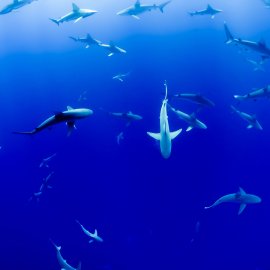Trophic Cascade: Apex Predators, Ocean Ecology and the Food Chain
-
English
-
ListenPause
[intro music] Welcome to World Ocean Radio… I’m Peter Neill, Director of the World Ocean Observatory. A trophic cascade is an ecological phenomenon triggered by the addition or removal of top predators and involving reciprocal changes in the relative populations of predator and prey through a food chain, which often results in dramatic changes in ecosystem structure and nutrient cycling. Gwynn Guilford in the April 2013 issue of The Atlantic points to fishing practices in China as examples of trophic cascade resulting from the extreme over-harvest of sharks for shark-fin soup, several other species with high value as components in various Chinese elixirs and remedies, and the manta ray, also known for its medicinal qualities. Shark-finning is of course a well known practice, the cutting of the fin and discarding of the rest, as the key ingredient in a recipe for soup that is especially prized by Chinese gourmets and those wishing to demonstrate their financial standing and success through the consumption of a very expensive (and not particularly tasty) status dish. There are have been several major public campaigns against shark-finning, promoted by active non-governmental organizations that have had some success in limiting the harvest, exposing the harvesters, and shaming the consumers. The Atlantic article points to two other examples, the bladders of totoba fish found in California waters and a similar fish, the bahaba, native to Chinese waters, both believed to promote fertility. A bahaba is reported to have fetched almost $500,000 on the black market, this for a species listed by the Chinese government as “protected” and thought by others to be nearly extinct. “Like the totoaba bladder and shark fins, gill rakers of manta rays – cartilage that filters the ray’s food – are prized for their supposed medicinal properties,” writes The Atlantic, “so much so that they fetch about $251 per kilogram. The $5 million trade in manta ray gill rakers – almost all of which occurs in Guangzhou, in southern China – has depleted manta populations so severely that they were classified as endangered.” So what about this trophic cascade? What is happening here is that the dramatic removal of large predators at the top of the ocean food chain will have additional impact on the species below. As sharks are killed, their predators flourish and increase, with consequences that change the interaction between lesser species, and that alters the predation pattern and thus the relative population numbers, food chain structure, and ecosystem balance. The change at the top, the sudden disappearance of a major determining force, then results in changes below that further disrupt the existing order of the marine system. Let’s see if I have got this right. It seems silly to say so, but is it not true that this entire process is justified to provide virility/fertility medicines or status symbols to consumers most probably ignorant of or indifferent to the consequences of their desires? Isn’t it ironic that we can harvest one species to extinction in order to foster procreation in another? The Chinese can kill fish, deplete their own waters, waste an astonishing volume of protein, intrude on other nations’ sovereignty, destroy coastal livelihoods on distant shores, deprive local tourism and economic development in struggling countries, lie, under-report, or otherwise game the system, ignore international quotas and agreements with impunity, and defy the concept of sustainability as a strategy for the future – all in the name of pleasure. Talk about your trophic cascade! So who’s the top predator here? In this case, it’s the Chinese. But there are other examples, other responsible parties; it’s any of us who sit at the top of the food chain and are able -- intellectually, financially or morally -- to support a system as absurd as this one. Where is the meaningful social value in this situation? If fish bladders, fins, and gill cartilage really do contain a cure for cancer, are there not other ways to meet the demand without decimating the supply? We will discuss these issues, and more, in future editions of World Ocean Radio. [outro music]
This week on World Ocean Radio we're discussing trophic cascade: an ecological phenomenon triggered by the addition or removal of top predators, involving changes in populations of both predator and prey through the food chain which often results in dramatic changes in the ecosystem. Shark, manta ray, totoaba, bahaba: all are aggressively harvested from the sea for their supposed medicinal properties and status. In this episode we ask listeners to consider this: if certain endangered species do in fact contain medicinal value, are there not other, more supportive and sustainable ways to meet demand without decimating the supply?
Do you prefer the written word? Head on over to Medium.com/@TheW2O.
About World Ocean Radio
World Ocean Radio is a weekly series of five-minute audio essays available for syndicated use at no cost by college and community radio stations worldwide. Peter Neill, Director of the World Ocean Observatory and host of World Ocean Radio, provides coverage of a broad spectrum of ocean issues from science and education to advocacy and exemplary projects.
Image Credit
Jakob Owens @jakobowens1
- Login to post comments



